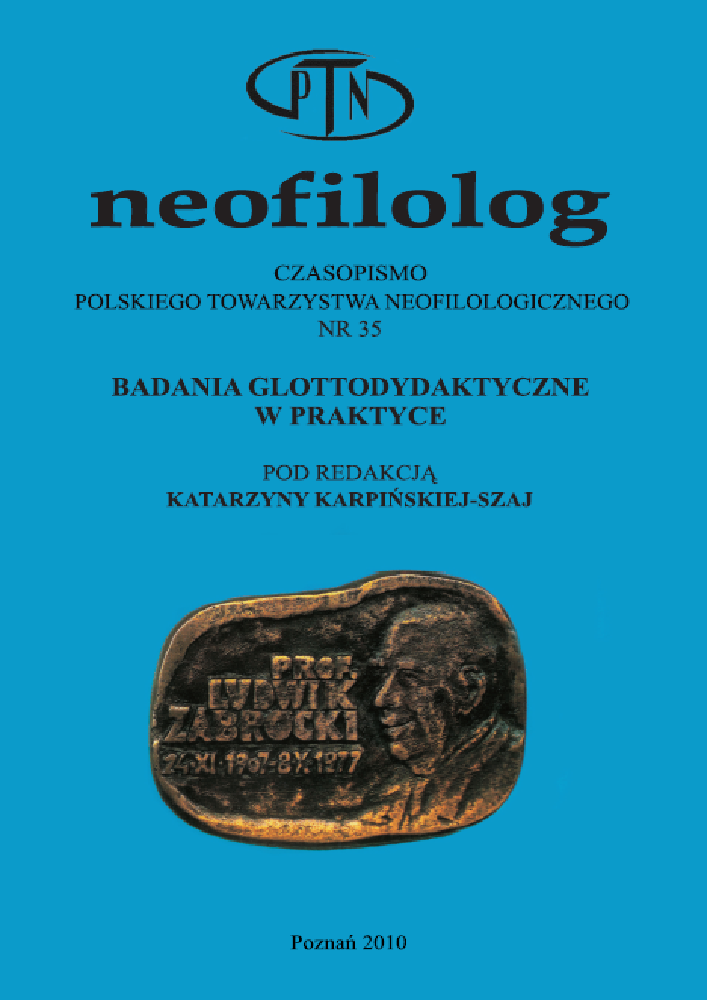Résumé
The aim of the present paper is to attempt to analyze selected factors which influence the learning of a second or foreign language. The goal is also to present the results of preliminary studies based on the observations of Russian language lessons. The introduction of a second foreign language into schools makes teaching multilingual. Students’ native language together with the languages they learn in and outside educational institutions all contribute to establishing a unique linguistic and cultural environment. The process of teaching and learning of a second language should refer to students’ knowledge and skills, which they acquired during their previous learning experiences.
Références
Aleksandrowicz-Pędich, L. 2003. Literatura amerykańska w kształceniu nauczycieli języka angielskiego. Białystok: Trans Humana Wydawnictwo Uniwersyteckie.
Aleksandrowicz-Pędich, L. 2005. Międzykulturowość na lekcjach języków obcych. Białystok: Wydawnictwo Uniwersytetu w Białymstoku.
Camilleri, A. 2000. „The Development of cognitive processes” (w) Approaches to Materials Design in European Textbooks: Implementing Principles of Authenticity, Learner Autonomy, Cultural Awareness (red. D. Newby). European Centre for Modern Language. Graz. 13-14.
Europejski system opisu kształcenia językowego: uczenie się, nauczanie, ocenianie. 2001. Red. nauk. H. Komorowska. Warszawa: Wydawnictwo CODN.
Figarski, W. 2003. Proces glottodydaktyczny w szkole. Warszawa: Wydawnictwo Uniwersytetu Warszawskiego.
Grucza, F. 1978. „Ogólne zagadnienia lapsologii” (w) Z problematyki błędów obcojęzycznych, (red. F. Grucza). Warszawa: WSiP.
Karolczuk, M. 2006. Грамматическая интерференция в процессе обучения русской речи польских студентов-филологов. Białystok: Wydawnictwo Uniwersytetu w Białymstoku.
Łobocki, M. 1982. Metody badań pedagogicznych. Warszawa: Wydawnictwo naukowe PWN.
Okoń, W. 2003. Wprowadzenie do dydaktyki ogólnej. Warszawa: Wydawnictwo Akademickie „Żak”.
Romanik, A. 2008. „Rola anglicyzmów w kształtowaniu leksyki odzieżowej i ich adaptacja w systemie języka rosyjskiego”. Studia Wschodnioslowiańskie 8. 167-175.
Rubin, J. 1975. „What the „Good Language Learner” Can Teach Us”. TESOL Quarterly 1. 41-51.
Stern, H. 1985. „What Can We Learn from the Good Language Learner?”. The Canadian Modern Language Review 31. 304-318.
Sobolew, L. 1987. „Strategie uczenia się języka obcego”. Języki Obce w Szkole 5. 159-163.
Szulc, A. 1997. Słownik dydaktyki języków obcych. Warszawa: Wydawnictwo naukowe PWN.
Zawadzka, E. 2004. Nauczyciele języków obcych w dobie przemian. Kraków: Oficyna Wydawnicza Impuls.
Бим, И. Л. 2001. Концепция обучения второму иностранному языку (немецкий на базе английского). Обнимск: Титул.
Савчук, Е. А. 2004. Обучение испанскому языку как второму иностранному на базе французского в гуманитарном вузе неязыкового профиля. Москва: Автореферат диссертации кандидата педагогических наук.
Щепилова, А. В. 2000. „Реализация сопоставительного подхода при обучении французскому языку как второму иностранному (на базе английского)”. Иностранные языки в школе 2. 23-29.
Licence
© Marzanna Karolczuk 2010

Ce travail est disponible sous licence Creative Commons Attribution - Pas de Modification 4.0 International.
Auteurs :
Les auteurs de textes acceptés pour publication dans la revue Neofilolog sont tenus de remplir, signer et renvoyer à l'adresse de la rédaction, un accord sur l'octroi d'une licence gratuite pour les œuvres, avec obligation d'accorder une sous-licence CC.
En vertu de cet accord, les auteurs des textes publiés dans la revue Neofilolog accordent à l'Université Adam Mickiewicz de Poznań une licence non exclusive et gratuite et permettent l'utilisation de la sous-licence Creative Commons Attribution-NoDerivatives 4.0 International (CC BY-ND 4.0).
Les auteurs se réservent le droit de disposer librement de l'œuvre.
Utilisateurs :
Les utilisateurs d'Internet intéressés ont le droit d'utiliser les œuvres publiées à partir de l'année 2017 sous réserve des conditions suivantes :
- reconnaissance de la qualité d'auteur - l'obligation de fournir des informations sur la qualité d'auteur, le titre, la source (liens vers l'œuvre originale, DOI) et la licence, ainsi que l'œuvre distribuée ;
- sans créer d'œuvres dérivées - l'œuvre doit être conservée dans sa forme originale, p. ex. les traductions ou les interprétations ne peuvent être distribuées sans le consentement de l'auteur.
Tous les textes publiés sont soumis au droit d'auteur.
Autres :
L'Université Adam Mickiewicz de Poznań se réserve le droit à la revue dans son ensemble (mise en page, forme graphique, titre, conception de la couverture, logo, etc.).
.
